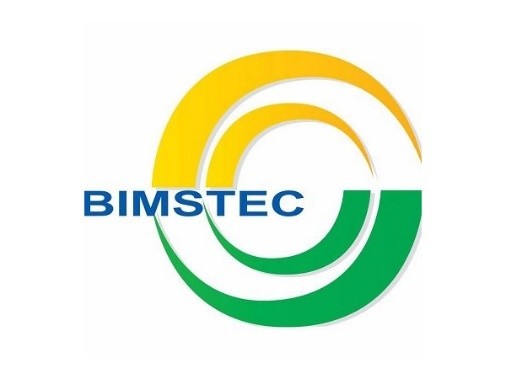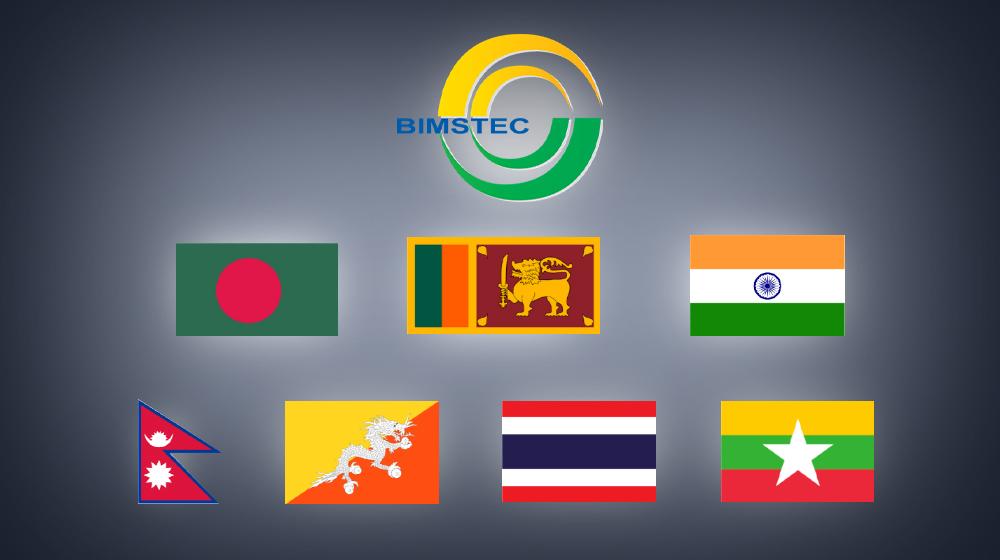6th BIMSTEC Summit

- 07 Apr 2025
In News:
The 6th BIMSTEC Summit was recently held in Bangkok, Thailand, under the theme “BIMSTEC: Prosperous, Resilient, and Open.”The Indian Prime Minister participated in the Summit, emphasizing regional connectivity, economic integration, and collective resilience.
About BIMSTEC
- Full Form: Bay of Bengal Initiative for Multi-Sectoral Technical and Economic Cooperation
- Members: Bangladesh, Bhutan, India, Myanmar, Nepal, Sri Lanka, and Thailand
- Founded: 1997 (Bangkok Declaration)
- Initial Name: BIST-EC (later BIMST-EC, and finally BIMSTEC in 2004)
- Population & Economy: Covers 1.7 billion people (~22% of world population) with a combined GDP of USD 5.2 trillion (2023)
Key Outcomes:
- Summit Declarations and Documents
- Bangkok Vision 2030: Adopted as a roadmap for regional economic integration, technological collaboration, and resilience against global challenges.
- 21-point Action Plan: Proposed by India to revitalize BIMSTEC as a dynamic platform for regional cooperation, especially in light of SAARC’s dormancy.
- Institutional and Governance Reforms
- Enforcement of the BIMSTEC Charter.
- Institutionalization of the Home Ministers' Mechanism, with India offering to host the first meeting.
- Strengthening mechanisms to counter terrorism, cybercrime, and human trafficking.
India’s Key Announcements and Initiatives
A. Centres of Excellence
India announced the establishment of BIMSTEC Centres of Excellence in:
- Disaster Management
- Sustainable Maritime Transport
- Traditional Medicine
- Agricultural Research and Training
B. Connectivity and Digital Infrastructure
- Operationalization of the BIMSTEC Energy Centre in Bengaluru.
- Proposal to link India’s UPI with BIMSTEC payment systems.
- Launch of a pilot study on Digital Public Infrastructure (DPI) for governance and service delivery.
C. Trade and Economic Integration
- Proposal to create a BIMSTEC Chamber of Commerce.
- Plan for an Annual Business Summit.
- Suggestion for a feasibility study on trade in local currencies.
D. Maritime and Space Cooperation
- Proposal for a Sustainable Maritime Transport Centre in India.
- Support for electric grid interconnection across member states.
- Space cooperation: development of nano-satellites, remote sensing data sharing, and training via a dedicated ground station.
Human Development and Cultural Engagement
- BIMSTEC for Organized Development of Human Resource Infrastructure (BODHI):
- Training for 300 youth annually.
- Scholarships (e.g., Nalanda University, Forestry Research Institute).
- Diplomatic training programs.
Health Sector
- Cancer Care Capacity Building Program for BIMSTEC countries.
Youth and Cultural Initiatives
- BIMSTEC Traditional Music Festival
- Young Leaders’ SummitandHackathon
- Young Professional Visitors Program
- BIMSTEC Athletics Meet (2025)
- BIMSTEC Games (2027)– to mark the 30th anniversary
India–Thailand Strategic Partnership (Announced on Sidelines)
Maritime and Regional Cooperation
- Strengthening ties via Indo-Pacific Oceans Initiative (IPOI) and ASEAN Outlook on Indo-Pacific (AOIP).
- Boosting connectivity via the India–Myanmar–Thailand Trilateral Highway.
Defence and Security
- Expansion of defence dialogues and joint military exercises (e.g., Exercise Maitree).
- Cooperation in cybersecurity, counter-terrorism, and intelligence sharing.
Economic and Trade Engagement
- Enhancing supply chain resilience, boosting bilateral trade, and exploring FTA upgradation.
Science and Innovation
- Joint ventures in renewable energy, space technology, and biotech innovation.
- Cooperation on digital public infrastructure.
Cultural Relations
- Promotion of Buddhist heritage, education exchanges, and tourism.
- Engagement with the Indian diaspora in Thailand.
6th BIMSTEC Summit
- 03 Apr 2025
In News:
- The 6th BIMSTEC Summit is scheduled for April 4, 2025, in Bangkok, Thailand, under the theme "Prosperous, Resilient, and Open BIMSTEC."
- It aims to deepen cooperation among member states on trade, security, connectivity, and sustainable development, while endorsing the long-term roadmap titled Bangkok Vision 2030.
About BIMSTEC (Bay of Bengal Initiative for Multi-Sectoral Technical and Economic Cooperation)
- Established: 6 June 1997 (via Bangkok Declaration)
- Initial Name: BIST-EC (Bangladesh, India, Sri Lanka, Thailand Economic Cooperation)
- Evolution:
- Renamed BIMST-EC in 1997 with Myanmar’s inclusion
- Full members as of 2004: Bangladesh, Bhutan, India, Myanmar, Nepal, Sri Lanka, and Thailand
- Headquarters: Dhaka, Bangladesh (Operational since 2014)
- Chairmanship: Rotational, alphabetical order
- Structure: Guided by the BIMSTEC Charter (adopted in 2022)
Objectives and Strategic Focus
- Foster economic and technical cooperation among littoral states of the Bay of Bengal
- Promote collaboration in trade, energy, transport, security, technology, and environmental protection
- Enhance regional connectivity through infrastructure, digital links, and maritime transport
- Address shared challenges like terrorism, poverty, natural disasters, and climate change
- Strengthen people-to-people exchanges and institutional frameworks
Highlights of the 6th Summit
- Follows the 5th Summit held virtually in Colombo (2022)
- Preceded by:
- Senior Officials’ Meeting (April 2, 2025)
- Foreign/External Affairs Ministers’ Meeting (April 3, 2025)
Key Agendas and Agreements:
- 6th BIMSTEC Summit Declaration – outlining vision and action points
- Bangkok Vision 2030 – strategic roadmap for future cooperation
- Agreement on Maritime Transport Cooperation – enhancing cargo and passenger movement across Bay of Bengal
- MoUs with:
- Indian Ocean Rim Association (IORA)
- United Nations Office on Drugs and Crime (UNODC)
- Rules of Procedure for BIMSTEC Mechanisms – to operationalize the 2022 Charter
- Report of the Eminent Persons Group – outlines BIMSTEC's future direction; implementation has begun
Sectoral Priorities
- Reforms in 2021 streamlined BIMSTEC’s focus to seven core sectors:
- Trade, Investment and Development
- Environment and Climate Change
- Security and Counter-Terrorism
- Agriculture and Food Security
- Connectivity
- People-to-People Contact
- Science, Technology and Innovation
- Emerging Focus Areas: Blue Economy and Disaster Risk Management
Significance
- Geostrategic Bridge: Connects South Asia and Southeast Asia, supplementing SAARC and ASEAN efforts
- Reinforces BIMSTEC’s role as the sole regional platform in the Bay of Bengal
- Strengthens institutional architecture for regional peace, prosperity, and resilience
BIMSTEC Charter

- 03 Apr 2024
Why is it in the News?
Recently, a significant majority in Nepal's Lower House backed the proposal to endorse the BIMSTEC Charter.
About the BIMSTEC Charter:
- The BIMSTEC Charter, officially signed and adopted during the Fifth BIMSTEC Summit in Colombo, Sri Lanka in 2022, serves as a cornerstone legal and institutional framework for the Bay of Bengal Initiative for Multi-Sectoral Technical and Economic Cooperation (BIMSTEC).
- This charter aims to establish a structured environment conducive to rapid economic development by delineating specific cooperation projects within the agreed areas of collaboration, along with potential expansions into additional areas as mutually agreed upon by Member States.
- Furthermore, the charter reaffirms the enduring commitment to the foundational principles and objectives of BIMSTEC, as articulated in the Bangkok Declaration of 1997.
The Importance of the BIMSTEC Charter:
- By officially adopting the BIMSTEC Charter, the organization transforms into a structured institution comprising member states situated along the Bay of Bengal, thereby formalizing their cooperation and dependence on this vital maritime region.
- The Charter grants BIMSTEC the authority to establish external relations with non-member states, developmental partners, as well as regional, UN, and international organizations, facilitating broader collaboration and engagement.
- Moreover, it underscores the imperative for a fair, just, equitable, and transparent global order while reiterating the commitment to multilateralism, with the United Nations at its core, and advocating for a rule-based international trading system.
About the Bay of Bengal Initiative for Multi-Sectoral Technical and Economic Cooperation (BIMSTEC):
- The Bay of Bengal Initiative for Multi-Sectoral Technical and Economic Cooperation (BIMSTEC) is a regional organization comprising seven Member States lying in the littoral and adjacent areas of the Bay of Bengal constituting a contiguous regional unity.
- This sub-regional organization came into being on 6 June 1997 through the Bangkok Declaration.
- It constitutes seven Member States:
- Five derive from South Asia, including Bangladesh, Bhutan, India, Nepal, and Sri Lanka, and
- Two from Southeast Asia, including Myanmar and Thailand.
- Initially, the economic bloc was formed with four Member States with the acronym ‘BIST-EC’ (Bangladesh, India, Sri Lanka, and Thailand Economic Cooperation).
- Following the inclusion of Myanmar on 22 December 1997 during a special Ministerial Meeting in Bangkok, the Group was renamed ‘BIMST-EC’ (Bangladesh, India, Myanmar, Sri Lanka and Thailand Economic Cooperation).
- With the admission of Nepal and Bhutan at the 6th Ministerial Meeting (February 2004, Thailand), the name of the grouping was changed to ‘Bay of Bengal Initiative for Multi-Sectoral Technical and Economic Cooperation’ (BIMSTEC).
